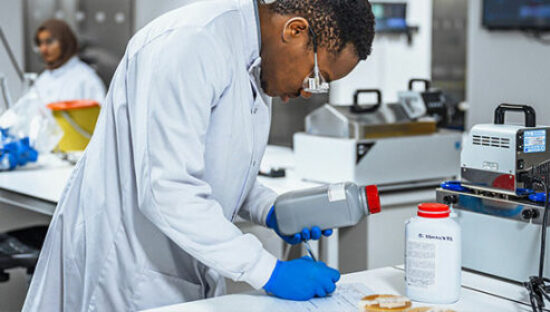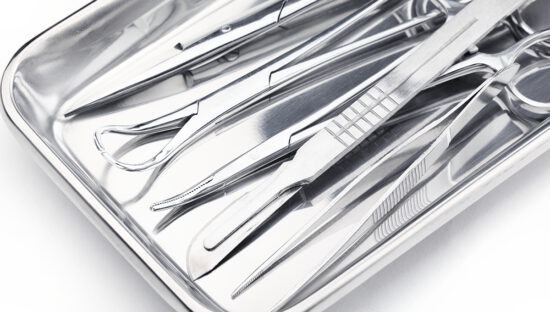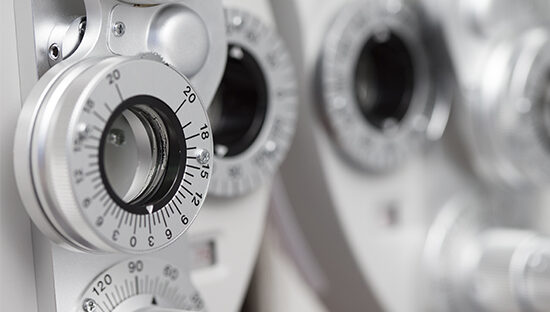
Medical Device Expert Spotlight
At Test Labs, our people are at the heart of what we do, and we’re proud to introduce one of our laboratory team members in this edition of Expert Spotlight – Chris Gilbert, our Laboratory Team Leader. Chris oversees the day-to-day operations of the lab, managing resources, schedules, and quality.
We invite you to learn more about Chris.
What do you do at Test Labs?
As Laboratory Team Leader, I am responsible for overseeing the day-to-day operations within the laboratory. I plan schedules, assess laboratory capacity, ensure resources are available for various projects, oversee routine equipment maintenance, and manage our team of five scientists. I really enjoy getting into the lab and working at the bench, but I often find my time taken up with meetings, preparing spreadsheets, scheduling, quality control, and working on controlled documents.

Where did your interest in science stem from?
Looking back on my childhood, I always had an interest in the natural world. My parents trained racehorses, which involved understanding of nutrition, knowledge of anatomy and physiology, and a certain amount of veterinary medicine. Furthermore, my grandfather had been a doctor during World War II in the Medical Corp, then a Respiratory Consultant before becoming the first Chief Medical Advisor at British Gas. Throughout my childhood he encouraged my curiosity and taught many lessons from the difference in soils and why it may effect the growth of plants to explanations of weather patterns and the use of a barometer. In school, science was a subject I always enjoyed and it seemed natural to follow that passion in my further education.
Have you always wanted to be a Laboratory Team Leader?
No, as a teenager I wanted to study Marine Biology because I liked the idea of spending my days on a boat scuba diving for samples. However, life led me in an alternative direction, and I entered the NHS as an apprentice Biomedical Support Worker in Gynae Cytology. I learnt to follow the path that interested me the most, so from there I continued into Histology and started my degree in Bioscience, which I completed while working. During my degree I really enjoyed novel research, so started looking for a role that I could gain more experience in this area. I worked my way up to Senior Study Scientist and got my MSc, developing lots of new skills such as GLP study management, Lab management, concentration determination by LC Ms/MS, PCR, PCR-extension cloning, SDS-Page, bioinformatics, immunohistochemistry, conjugation, etc. Unfortunately, my department was made redundant, and I looked for my next path, where I decided to try out teaching and gained my PGCE in Secondary Science. But during that year I really missed working in a regulated Laboratory. So I jumped back in as a Laboratory Team Leader, I have used my prior experience to step straight in but I am also afforded the opportunities to develop new skills in areas I have not had the chance with before.

What would your advice be for someone thinking of becoming a Healthcare Scientist?
Get as much experience as you can before settling on a path, there are so many different choices to explore. In the NHS, much of the work can be quite repetitive but you get satisfaction of knowing your role has a direct impact on patients lives with 90% of diagnosis requiring pathology results; there is Histology, Biochemistry, Haematology, Microbiology, Genetics, and many other interconnected areas of pathology to be part of. Outside of the NHS there are private pathology labs but also numerous supporting roles in research, development, and supply chains to keep healthcare at the cutting edge. At Test Labs, we take part in all three of these areas, helping clients still in the research phase develop their new device, ensuring that products are tested to the latest ISO standards before being implemented into the industry, and providing calibration services for existing products.
Healthcare sciences are so much broader than is often comprehended, even now I meet people on a regular basis who are developing techniques or products I had never imagined.
What makes collaboration between manufacturers and labs truly effective?
Trust. The laboratories are there to complete the testing to the highest standards, but if we don’t have all the data or information it can lead to problems later. We hold ourselves to the highest professional conduct and therefore you can trust that we will treat everything we do with the upmost respect. We can’t guarantee that every test will have the result a client wants but we will always guarantee the accuracy and repeatability of the test. In the long run even a bad result is providing the information to help find solutions to get a product to market and we will do our best to help find those solutions, if we have all the information.
What do you get up to when you’re not working in a medical device lab?
Much of my spare time is spent running my 11 year old daughter to numerous dance and swim competitions or various training sessions. Although, my most cherished time is spent with my family, sometimes playing music together, walking our dog, or watching movies.




